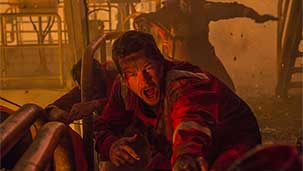Making a big budget movie about the worst mess in U.S. history is risky business. For one, you’re leaving the door wide-open for smart-ass critics to compare one (potential) disaster with another. James Cameron famously tempted that fate before releasing his wildly over-budgetTitanic. He, of course, was rewarded both critically and commercially for his audacity. Titanic’s fate couldn’t be more different than the event it depicted.
Deepwater Horizon will also diverge from its famous oil spill, but in a very different way: history will forget this film, which will quietly disappear without having left much of a mark.
The same obviously can’t be said of the biggest environmental disaster in U.S. history. Back in 2010, it was simply referred to as the “BP oil spill”. Week after week, there seemed to be no end in sight for the environmental catastrophe. Hundreds of millions of gallons of oil blew out from the sea-floor after an off-shore drilling unit exploded, claiming 11 lives. And it’s in this initial fiery chaos that Peter Berg focuses his (obvious) lens.
He leaves it to people like you to clean up his sloppy visual storytelling. Once again we are reminded that, as hard as Berg tries, Michael Bay he is not.
Digging for oil is dirty business. You can indulge that grit by giving your characters a romantic glow amid the mud (Michael Bay’s Armageddon) or cast a cold eye on crude oil for a disturbing, yet equally beautiful effect (P.T. Anderson’s There Will Be Blood). What you should not do is make an already muddy situation worse by obstructing the image in key moments and undercutting human emotion with glaringly obvious visual effects.
Normally, a person like you is hired to cover these seams. But while the film does a workman-like job in its first half by setting the stage and laying down the stakes with simple metaphors, I found myself strangely disengaged when it mattered most. And frankly, it was your fault.
There is a moment of sacrifice when a person falls to their fate from an oil rig. Compare it to the finale of Backdraft – also co-starring Kurt Russel – where the impact of the body hitting the steel beams is visceral. Of course in 1991, that was achieved with real fire and a life-like dummy. In 2016, it’s VFX artists like you that crunch the numbers to produce a similar moment. But in an error as old as computer graphics themselves, the effects in Deepwater Horizon are weightless and emotionally inconsequential. Detrimental, in fact. Especially for a film that’s already treading water. There’s a similar shot in Titanic of a man tumbling off the sinking ship and spinning as he hits a guard rail. It looked mawkishly fake even at the time, but luckily the rest of the drama held that story afloat.
By contrast, there’s a moment in Deepwater Horizon when Russell’s character needs to remove an awfully large shard of glass from his bare foot. That scene provided me with more recoil and emotional investment than anything else in the film. The focus was clean and clear, even if the subject was grisly and disgusting. You may have been equally involved here, in which case congrats. But it’s that principle that was missing from the rest of the film – up to and including the explosion rising up through the oil tower. It’s 2016 – we just can’t accept sloppy effects. Even in a movie that’s all about messiness and sloppy choices.
Sincerely,

Christopher
Now kids can escape from an oil rig too! Ages 6-12...
Check out this DC&C Special Tie-in today.







